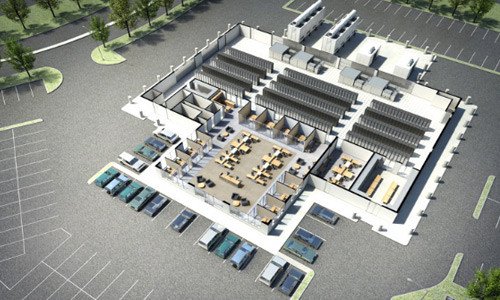Isn’t it a concern that you’re building data centers next to shopping malls? Wouldn’t it be safer to build them in remote areas where there isn’t as much foot traffic like the others do?
Sean Farney finds himself answering questions like this a lot. As chief operating officer at Ubiquity Critical Environments, he is one of the people in charge of converting Sears’ automotive repair shops at shopping malls around the US into data centers.
Ubiquity is part of Sears Holdings Corp., the operator of thousands of massive retail stores around the country, many of which also have auto centers next to them. About 800 of those can potentially be converted into data centers, Farney says.
A single building’s footprint ranges between 10,000 sq ft and 60,000 sq ft. “In those facilities, I can build a minimum of 1MW, all the way up to 4MW, easily,” he says.
What has created the opportunity for Sears to re-purpose a massive chunk of its real estate holdings for this highly lucrative use is technological progress in mechanical and electrical infrastructure for data centers. The infrastructure equipment is now highly commoditized.
“We can take this .. gear and put it in any building type,” Farney says. Plus, there are obvious cost, speed-to-market and environmental advantages to re-purposing existing buildings.
Farney is sitting on a panel that will discuss these advantages in depth at next week’s DatacenterDynamics Converged conference in New York City.
“Brownfield makes a lot of sense,” he says. “It delivers product faster; it opens a lot of opportunities for where to build.”
Yes, having a data center near a shopping mall is not for everyone, but Ubiquity is not going after customers for whom this type of location would be an issue, such as banks. The target customers are enterprises as well as small and medium-size businesses.
With appropriate fencing, area surveillance and guard staff, you can have the same level of security near a shopping mall as you do in an industrial park, Farney says.
Ubiquity plans to provide single-tenant wholesale data center space, but will also have some facilities for retail colocation services. The first phase of the build-out includes 25 sites that are going to be converted into 1.4MW data centers.
The company is going after lower-tier US markets, as opposed to high-octane areas like New York, Silicon Valley or Chicago. “We’re targeting the underserved heartland of the US,” Farney says.
Hear more details on Ubiquity’s plans and meet key players from the New York-New Jersey data center industry at DatacenterDynamics Converged 2014 conference in Manhattan on Tuesday, 11 March.

